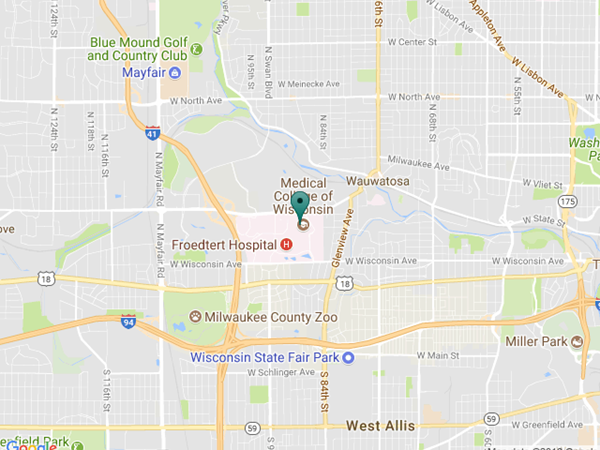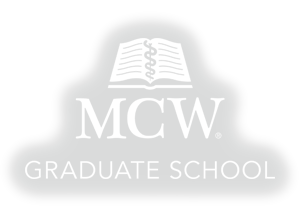Certificate of Advanced Qualifications in Human Subjects Protections at the Medical College of Wisconsin
The Certificate of Advanced Qualifications in Human Subjects Protection, co-sponsored by the Clinical and Translational Sciences Institute and the Center for Bioethics and Medical Humanities, provides additional training and academic benefit to advanced IRB members, i.e., those that have served on an IRB for more than two years.
- Credits: 12
- Type: Online

Message from the Director
Over the years, MCW's bioethics programs have been recognized for their intellectual rigor and leadership in bioethics and research ethics education. As the Co-Directors of the Certificate of Advanced Qualifications in Human Subjects Protection, we are committed to promoting this tradition of academic excellence and to foster a student-centered learning environment. If you have any questions about the bioethics programs or the application process, please don't hesitate to contact either of us.
Certificate of Advanced Qualifications in Human Subjects Protection
About the Program
This certificate is designed to explore more advanced topics in human subjects protections relevant to IRB work in the area of ethics, regulations, current topics, and IRB member skills and professionalism. Graduates of this certificate will be able to specialize in IRB work and research, akin to recent developments in quality improvement, in which faculty and staff have undertaken specialization in their field. Upon completion of this program, graduates will be ready to conduct their own research to advance the field of regulatory science in addition to being better equipped to serve as senior IRB members, perhaps eventually moving into leadership roles. The certificate will enroll a cohort of new students every other year, as the bioethics-based courses will only be offered every other year.
Admissions
Applying to the Certificate of Advanced Qualifications in Human Subjects Protection Program
Individuals interested in the Certificate program must apply through the Medical College of Wisconsin’s School of Graduate Studies. The application process consists of: (1) completing and submitting the online application form with a $50 application fee; (2) providing official transcript for an earned baccalaureate degree; and (3) providing letters of recommendation with recommendation forms from at least two references who can comment on the applicant’s ability to succeed in the program.
Criteria for admission include a minimum of 2 years professional experience as a member of an IRB; college and, if applicable, graduate or professional school grades; commitment to the field of research ethics; and, promise in the program’s academic areas.
All applications are reviewed by the Program’s Graduate Admissions Committee. The outcome of the committee review is forwarded to the Dean as a recommendation for admission or rejection.
Application deadlines is July 1 for Fall admission only in odd years, i.e. 2019, 2021, etc.
Curriculum
The program consists of a total of four required courses:
- Introduction to Research Ethics (3 credits)
- Regulatory Issues in Human Subject Research Protections (3 credits)
- Current Topics in Research Ethics (3 credits)
- Mastering Human Subjects Protections: Meetings, Members, and Processes (3 credits)
The certificate will enroll a cohort of new students every other year, as the bioethics-based courses will only be offered every other year. Therefore, students will take one course per semester to complete the program.
All of the courses of the certificate program are offered online. The technical requirements are minimal, i.e., ability to use a Web-browser and email. Class discussions and case analyses are conducted primarily in non-real time, so students can participate at their convenience during each week. However, students are paced on a week-to-week basis just as in a campus course. Moreover, the pedagogical capabilities of the online environment enhance the class discussions and allow for individualized instructor feedback, which empowers the learners and makes the courses truly student-centered.
Participants receive a Certificate of Advanced Qualifications in Human Subjects Protection from the Medical College of Wisconsin’s School of Graduate Studies upon completion of the four courses. Each course is also worth graduate credit which may be applicable to the Bioethics MA degree.
Core Curriculum (Required) Courses
Introduction to Research Ethics – Bioethics 10207 (3 credits)
This course will provide students with a comprehensive introduction to the ethical issues involved in scientific, animal, and human subjects research. After a brief look back at the history of research ethics, students will spend time considering issues that impact research in both the laboratory setting and in the clinical setting. This course provides the necessary research ethics instruction required to satisfy the United States Public Health Service Policy on Instruction in the Responsible Conduct of Research for institutions receiving research funds from the Department of Health and Human Services (issued December 1, 2000).
Regulatory Issues in Human Subject Research Protections – Bioethics 10226 (3 credits)
There is no question that the fruits of research have fueled medical progress. Yet, the history of research involving human subjects is not unblemished. Federal regulations, based on ethical principles set forth in the Belmont Report, now govern much of the research undertaken in the United States. In this course, we will explore the history and substance of research regulations in the United States, the application of the regulations to specific research issues, and situations where the regulations do not provide clear guidance. Prerequisites: Bioethics 10207 or sufficient practical experience in research ethics as determined by the course instructor.
Current Topics in Research Ethics – Bioethics 10228 (3 credits)
Rapidly evolving scientific and technologic capabilities in medicine combined with an ever-increasing demand to translate these scientific developments to the bedside presents new challenges to regulating human subjects research. This course seeks to keep pace with many of these new and emerging challenges, providing students an opportunity to critically examine the ethical and legal implications of these topics. Specific topics for analysis will be drawn from the current medical literature, popular press, and evolving policy guidance. Prerequisites: Bioethics 10207 or sufficient practical experience in research ethics as determined by the course instructor.
Mastering Human Subjects Protections: Meetings, Members, and Processes Clinical Translational Science (3 credits)
This course is an advanced examination of the concepts, theories, and principles of IRB decision-making designed for experienced (3 years or more) IRB members. The course will consider ways to satisfy regulatory requirements and ethical review for biomedical research with focus, efficiency, and depth. The course will pay attention to distinguishing between major regulatory or ethical questions, on one hand, and non-critical questions or change requests, on the other. The course will also review ways that IRB Chairs and IRB members can more quickly illuminate differences of opinion in a way that allows thoughtful committee resolution of controversial impasses.
Tuition and Fees
If you have questions regarding tuition or your account, please contact the Office of Student Accounts, at (414) 955-8172 or mcwtuition@mcw.edu. Please refer to the All Student Handbook (PDF) for tuition payment policies and information.
PhD Students
All full-time PhD students receive a full tuition remission, health insurance and stipend.
Masters, Certificate & Non-Degree Students
Students seeking financial aid for MPH, MS or MA degree programs, visit the Financial Aid Office website.
Current MCW Employees
Tuition Course Approval Form - Human Resources (PDF)
Late Fees
There is a $250 late payment fee for tuition not paid on time according to the Tuition Payments policy in the All Student Handbook (PDF).
Follow Us On Our Socials
Stay up-to-date on events, news, and other happenings in the MCW Graduate School!




